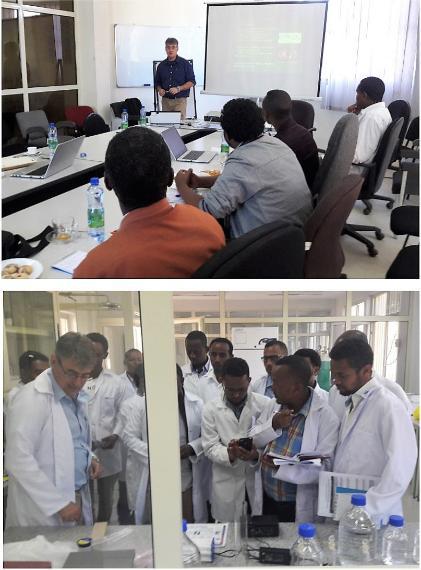Project in Ethiopia
Mycotoxin Prevalence and Mitigation Measures in Ethiopia
Timeframe: November 2016 - March 2019
Funding: USAID
Principal investigator (PI) and lead institution
Yacob Zereyesus, Kansas State University
Co-PI and collaborator institutions
- Carl Birkelo, ACDI/VOCA
- Deon van der Merwe, Kansas State University
- Veterinary Drug and Animal Feed Administration and Control Authority (VDAFACA)
Innovation Summary for Mycotoxin Testing
Project Plan
 Mycotoxins in livestock feed pose a direct threat to livestock health, reduce feed quality and availability, and could affect human health through exposure via the consumption of animal products. The major determinants of mycotoxin production are environmental conditions related to climate and weather patterns, physical damage to crops by factors such as hail, insects, or mechanical equipment, and the presence of high moisture and aerobic conditions anywhere in the production chain from the field to processing and storage. Ethiopian weather patterns, between as well as within seasons, are highly variable, and agricultural practices are varied due to the presence of a wide range of production systems. These factors make mycotoxin production patterns in Ethiopia particularly hard to predict.
Mycotoxins in livestock feed pose a direct threat to livestock health, reduce feed quality and availability, and could affect human health through exposure via the consumption of animal products. The major determinants of mycotoxin production are environmental conditions related to climate and weather patterns, physical damage to crops by factors such as hail, insects, or mechanical equipment, and the presence of high moisture and aerobic conditions anywhere in the production chain from the field to processing and storage. Ethiopian weather patterns, between as well as within seasons, are highly variable, and agricultural practices are varied due to the presence of a wide range of production systems. These factors make mycotoxin production patterns in Ethiopia particularly hard to predict.
This study assessed mycotoxin levels in the feed supply network of Ethiopia through an initial broad sampling survey of feed materials at farmer cooperative unions. The objectives of this project are to: (1) Use mycotoxin prevalence data to assess risks to the Ethiopian livestock industry in areas where testing is conducted; (2) Enhance mycotoxin testing capacity in an important segment of the livestock feed supply in Ethiopia; (3) Communicate mycotoxin risk information to stakeholders in order to enhance risk management strategies. Regional testing facilities and a reference laboratory in Addis Ababa will be equipped and trained to perform mycotoxin testing using lateral flow technology. Regional laboratory results will be verified by testing split samples at a reference laboratory in Addis Ababa, which will in turn be validated through an accredited laboratory in the U.S. by means of HPLC methods. A more strategic sampling and definition of identified mycotoxin hazards will follow based on the initial sampling results. Statistical analysis will be done and risk assessments defined. Findings will be shared with regulators and other stakeholders during briefings.
The project sampling and analysis will center on 24 farmer cooperatives unions (FCUs) (membership 1.18 million) with whom ACDI/VOCA has been working under the USDA-funded Feed Enhancement for Ethiopian Development – Phase II (FEED II). These FCUs are in highland areas within multiple regional states of Ethiopia where feed enterprise units have been developed to provide improved feed products and services.
More Information
 October 2020 research update ZEREYESUS VGM (Virtual General Meeting)
October 2020 research update ZEREYESUS VGM (Virtual General Meeting)
- Project leaflet: Mycotoxin Prevalence and Mitigation Measures in Ethiopia
Photo credit: B. Getachew
Feed the Future Innovation Lab for Livestock Systems is part of Feed the Future





